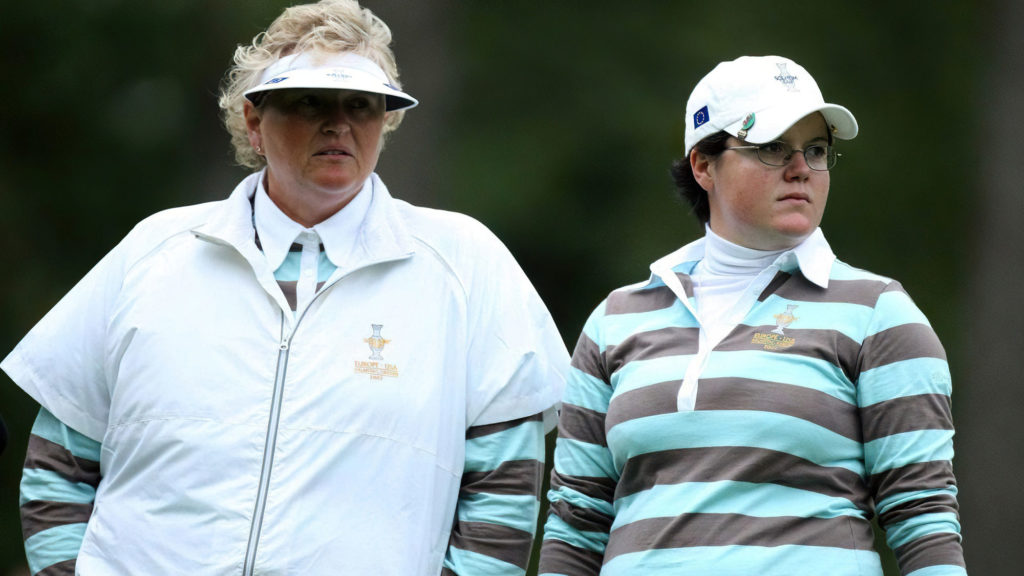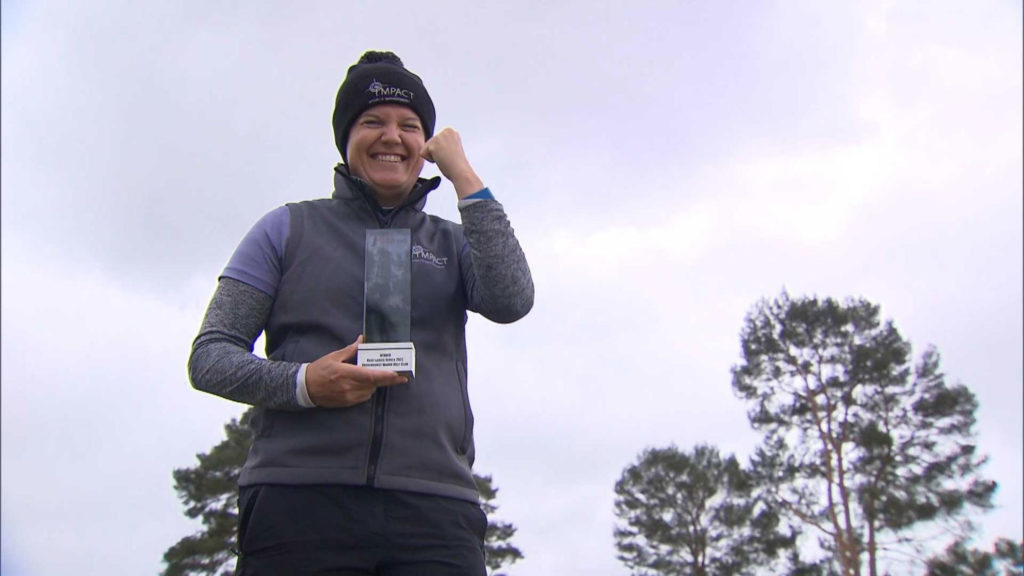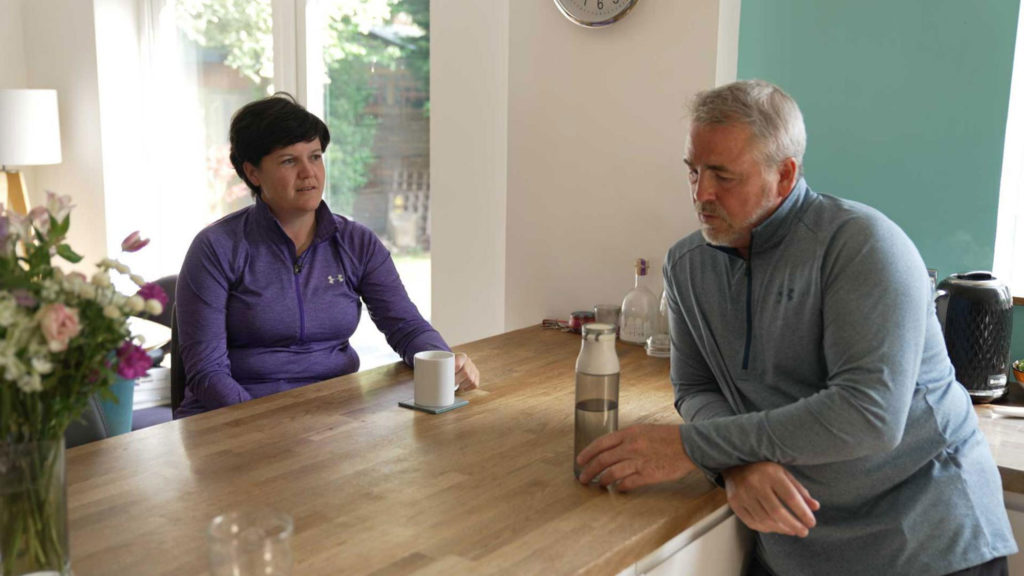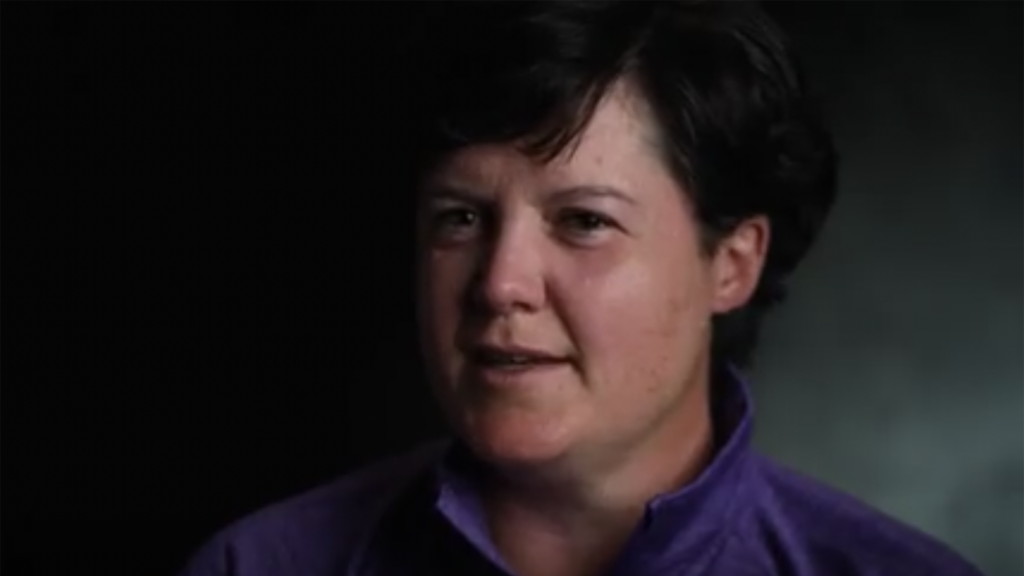The Solheim Cup star was a rising talent in Europe who saw her world collapse around her – then fought to regain it.
For professional golfer Becky Brewerton, her achievements on the course across almost two decades appeared remarkable on the surface. A résumé that boasted two Solheim Cup appearances (2007 and 2009) and multiple Ladies European Tour wins would be the envy of many professionals.
Lying underneath was a confusing concoction of misery coupled with a constant battle with mental demons that only she could feel and hear. Brewerton, who turned 40 in October, kept the seismic scale of these issues to herself before revealing them to the world in a blog post titled, “How did I become so bad at golf?” in November 2021. Earlier this year, we spent a day with the Welshwoman to detail her story – one of initial pain but ultimately triumph – culminating in a documentary for Golf Digest. “Becky Brewerton – My Story” examines how a rising star in the game of golf had her world collapse around her and the fight to regain it.
▶ ▶ ▶

In 2012, Brewerton had a nasty bike incident, which unofficially signalled the beginning of her problems. “It was almost like it just triggered some sort of response,” she said later. “I vividly remember the very next tournament after that had happened. I only had a few weeks before I was supposed to travel to Australia to play in some events, and my whole left leg was black. It was quite painful, but it didn’t feel like a physical thing. It just knocked my confidence enough to kind of put me in a different headspace.
“I remember saying to someone at the time, if you watch the Austin Powers films and someone says he’s taken away his mojo, it was like someone had removed this thing from my body that I needed to be able to cope or to be able to push all that stuff down and be able to perform. It was just gone, basically.”
Brewerton described what happened to her next as if her mind had entered a haze. “I wasn’t thinking about my own golf in a rational way. If someone else had come up to me and said, ‘Look, this is what has happened to me, what should I do?’ I probably would have said, ‘You need to take a break. You need to heal physically, do some work mentally and then come back after you’ve worked on it a bit.’ But I had zero ability to be objective about myself. It felt like even the easiest decisions to make just all of a sudden became really hard.”
In her November 2021 post, Brewerton highlighted one moment that signified how far she had fallen. Arriving at the 2016 Ladies European Open, she was requested not to turn up for the second round after an opening-round 88. Her physical ailments were now mental, and any confidence on the course vanished.
“When we arrived at that course, it was a new venue that we hadn’t played before. It was the most horrible feeling because as soon as we arrived at the venue, I picked up my yardage book, and I sort of looked at a few of the holes from the clubhouse, and it was like that dread of, ‘Oh no.’ This is exactly the sort of course that’s going to trigger the yips.
“If I went back there now, I’d probably look at it and think, I don’t even know what I was worried about. But the way I was looking at it at the time, it was like every hole was an opportunity to lose a ball or hit it in the trees. I just kept thinking, sometimes it started off, How am I going to break 80 around here? How am I going to break 90? Or am I going to break 100? It would keep going up and up and up.”
The sheer thought of even playing the game that she loved seemed like an impossibility.
Brewerton wrote: “I was struggling to even walk to the first tee without feeling like my heart was going to explode out of my chest, terrified of even attempting to try to get that little white ball to go somewhere near where I wanted it to go. I kept arriving at events petrified of being there, knowing that as soon as Thursday came, I’d be fighting panic attacks.
“Knowing that I’d be hitting a provisional after every first tee shot. Knowing that I had the yips off the tee and there was nothing I could do to stop it. I was scared to give myself a single second to think about what was happening to me. At tournaments and at home, I would make myself endlessly busy, anything to avoid looking into the scrambled mess of my brain.”
There wasn’t a remedy. Even after taking time off from competition, the anxiety returned as soon as she walked to the first tee. With a lack of on-course success, not only was Brewerton’s game causing her emotional pain, but the lack of steady income also began to take its toll.
“I started to accept the fact I had a severe case of burnout, and the yips on top of that. I had to hit rock bottom, with no car, no money and nowhere to live, to truly turn things around.”
To make ends meet, Brewerton took on extra jobs away from golf, which included time at Amazon as well as Deliveroo.
“I would sit up quite often at night, worrying about paying this and paying that,” she said. “Obviously when you’ve got bills to pay as well… I was a bit stuck in that situation of actually not knowing and being a bit naïve maybe. Not knowing what happens if you miss a payment on something or what happens if you miss a mortgage payment one month and stuff like that.”
As Brewerton confesses about hitting rock bottom, her story changes. Steve Bond, a close friend, offered her a place to live and the support she needed to piece together her return to golf.
Bond, a physical therapist and director of Bond Fitness Spaces, explains what he saw and felt in the moment: “I vividly remember the call. She was sad, disillusioned, lonely, I guess. Looking for answers. She was distraught on the phone, and I said, ‘I’ve got an idea. Leave it with me.’ I spoke to [my wife] Andrea and straight away we said, ‘We’ve got a spare room, come along.’”
Brewerton now had a place to live and a loving support system. The road to recovery had a vision. As a physical therapist, Bond had a home gym set up and scheduled multiple sessions a day. Physically, Brewerton was now focused on flexibility, power and speed. Mentally, she was learning acceptance. That word, “accept”, is where Brewerton began her recovery. Accepting and being honest with the fact things are bad. Accepting the fact this could be it for her as a professional golfer. Accepting that change is needed.

These changes started to pave the way to a healthier and brighter outlook for Brewerton. “Even though my actual golf game was very slow to improve, my state of mind was starting to make me feel like there was some hope that I could at least be happy again,” she said. “Even if I never played on tour again, I just wanted to actually be able to enjoy a round of golf at least one more time. It’s amazing how long the desire to do that kept me going when the game seemed impossibly hard to get better at.
“My priorities now are far removed from those I had when I was younger. Instead of thinking that hitting endless balls is the only way to feel worthy of success, I now spend the bulk of my time looking after my mind to keep it healthy. It took me a long time to realise it can be the strongest part of my game and my life,” Brewerton wrote.
Writing the blog post, and emptying her heart and soul, was another aspect involved in reinventing the Brewerton of old. Putting pen to paper was something else that Bond got behind in the hope of getting her back on the straight and narrow.
“All of a sudden it just all came out. I think it was probably just my time where I thought, OK, I’m comfortable enough now to actually be able to have a conversation with someone about it without sort of collapsing into a heap.”
Years of mental trauma and pain were now down in black and white and put out into the ether of the internet. For Brewerton, the writing was another form of therapy, and the weight that was lifted off her shoulders allowed for a fresh start with a new outlook on life. It was only a matter of time before this rejuvenated, healthier mindset, transferred itself to what she loved the most: golf.
Determined to give it another crack, Brewerton entered events on the Rose Ladies Series. As she teed it up at Brokenhurst Manor in May 2021, little did she know what would entail.
“I was on the first tee and had this big wave of adrenaline, but it was one of the few times when I’d had that kind of surge and felt the tightness in my chest, but still managed to hit an OK shot.”
With Brewerton swinging freely, she got herself to the top of the leaderboard and recalls, “I got to the end of the day and had this putt on the last green, which I probably knew was to either win or possibly be in a playoff, and I holed it. It was all a bit surreal. It was slightly like an out-of-body experience. I didn’t quite feel like I was within myself.”
That putt indeed put her in a playoff, and Brewerton emerged victorious. She was back in the winner’s circle, 12 years removed from the last of her two Ladies European Tour wins. There are certain emotions a golfer feels when facing down a trophy, but Brewerton only felt one.
“I was completely calm. It was almost like it was just a release of all the pressure that had kind of been weighing me down for so long. In the playoff, I just was able to be free and hit the shots as I wanted. Thank goodness that the fear had kind of left me.”
Another couple of near misses later during the Rose Series signalled and solidified that Brewerton was in a better place than ever. It wasn’t until LET Q-School, however, that she really got to see the true culmination of all the hard work and hurdles that she had overcome. After the first two rounds of a five-day event, Brewerton was not in top form. Her mind started to wander on what she would do once her golf career was over. One phone call changed her outlook.

“I spoke to Alan, a performance guy that I’d been working with. He’d been the one who actually managed to get me to kind of really change my thought process at a deeper level. Something clicked. It was like a switch just flipped. I just let go of everything. I’ve never in my career had such a drastic change in performance level between one day and the next day. The first two days were probably some of the worst golf I’ve played in a long time, and the last three days were probably three of the best days that I’d ever had. It was almost like thinking, Well, now’s the time. Trust yourself. You may as well have a go. You may as well not worry about this and not worry about that. The turnaround was just unbelievable.”
From dead last to a ninth-place finish, the Welsh star had done more than enough to secure one of the 20 LET cards on offer. The years of torture and pain. All the physical and mental toll. It had all led to this moment of redemption. The voices in her head were wrong.
“This is like a second chance, it’s like starting again. A new career. My level of appreciation for it has gone through the roof. It feels like someone has gifted me an opportunity to start again.”




